56 start with H start with H
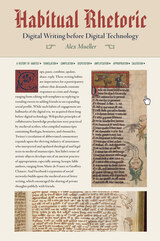
A Corrective to the Pervasive Belief that Digital Writing Practices are Entirely New
Writing has always been digital. Just as digits scribble with the quill or tap the typewriter, digits compose binary code and produce text on a screen. Over time, however, digital writing has come to be defined by numbers and chips, not fingers and parchment. We therefore assume that digital writing began with the invention of the computer and created new writing habits, such as copying, pasting, and sharing. Habitual Rhetoric: Digital Writing before Digital Technology makes the counterargument that these digital writing practices were established by the handwritten cultures of early medieval universities, which codified rhetorical habits—from translation to compilation to disputation to amplification to appropriation to salutation—through repetitive classroom practices and within annotatable manuscript environments. These embodied habits have persisted across time and space to develop durable dispositions, or habitus, which have the potential to challenge computational cultures of disinformation and surveillance that pervade the social media of today.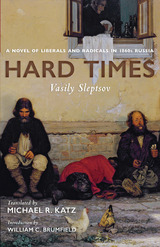
The novella Hard Times is considered Sleptsov’s most important work. It focused popular attention on the radical and liberal movements through its fictional setting, where the characters contend with constantly evolving political and social dilemmas. Hard Times was immediately recognized as a vibrant and compelling depiction of prerevolutionary Russian intellectual society, full of lively debates about the possibilities of liberal reform or radical revolution that questioned the viability of a political system facing massive social problems.
This is the first English-language version of Hard Times, expertly and fluidly translated by Michael Katz. Highly readable, it provides important historical insights on the political and social climate of a volatile and transformative period in Russia history.
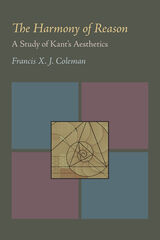
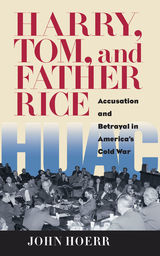
John Hoerr tells the story of three men—his uncle, Congressman Harry Davenport, union leader Tom Quinn, and Father Charles Owen Rice—whose lives became intertwined during the anti-Communist witch hunts of the McCarthy Era. The story helps illuminate one of the more repressive periods in American history, when thousands of Americans guilty only of enlisting in leftist causes were caught up in dragnets cast by overzealous Communist hunters on behalf of the House Un-American Activities Committee and other bodies. Much has been written about well-known cultural figures (the Hollywood Ten), and prominent writers (Arthur Miller and Lillian Hellman) who contended with HUAC. Hoerr tells of mostly ordinary Americans who were largely unknown at the time, but whose stories are nonetheless remarkable.
Writing from personal experience with the title characters, as well as archival research, Hoerr recreates the events of the 1949 HUAC hearings, where rigged testimony by a few workers cast suspicion on their union brothers. The results would echo through the years, causing people to lose jobs, marriages, and self-respect. Hoerr traces the paths followed by Harry, Tom, and Father Rice and relates their individual experiences to the great conflict between anti-Communist and Communist forces in the American labor movement, leading to the eventual demise of the CIO (Congress of Industrial Organizations).
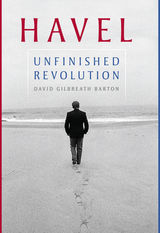
This is the story of a man who tried to resurrect the spirit of democratic life. He was born into a time of chaos and absurdity, and he took it as his fate to carry a candle into the night. This is his story and the story of many others, the writers, artists, actors, and philosophers who took it upon themselves to remember a tradition that had failed so miserably it had almost been forgotten.
Václav Havel (1936–2011), the famous Czech dissident, intellectual, and playwright, was there when a half million people came to Wenceslas Square to demand an end to Communism in 1989. Many came to hear him call for a free Czechoslovakia, for democratic elections, and a return to Europe. The demonstrators roared when he spoke. “Havel to the castle,” they chanted— meaning Havel for president. And a few weeks later, Havel became a most unusual president. He was sometimes misunderstood and not always popular, but by the time of his death in 2011, the world recognized Havel as one of the most prominent figures of the twentieth century.
Born into one of the most prominent and wealthy families in Prague, Havel was the constant subject of attention and an artistic eccentric in a family of businessmen. A young Havel and his family were cast by the Communist takeover as class enemies. Havel traveled a dark road that, ironically, provided the experiences he needed to reconnect not only to his own “ground of being” but to the traditions of civic society. This biography is the story of Havel’s inward journey in his underground years and thus the story of how Havel, the outsider, became the ultimate insider as president of the nation.
In this intimate and sweeping portrayal of Havel, David Barton reveals the eccentricities of the last president of Czechoslovakia, and the first president of the Czech Republic.
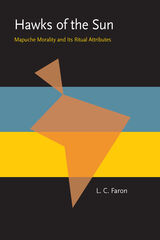
Southern central Chile supports one of the largest functioning indigenous societies in South America, the Mapuche, who have withstood more than four hundred years of persistent efforts at colonization and missionization. In spite of inevitable cultural and social change during those years, they have maintained a great measure of cultural and social integrity, and remain a regional, ethically conscious minority in Chile.
The Mapuche, in their own words, are “another race,” with their own gods, their own notions of right and wrong, their own symbolism. Abiding by the rules of their society ensures their eternal place among the hawks of the sun.



—Billy Collins
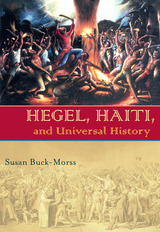
Historicizing the thought of Georg Wilhelm Friedrich Hegel and the actions taken in the Haitian Revolution, Buck-Morss examines the startling connections between the two and challenges us to widen the boundaries of our historical imagination. She finds that it is in the discontinuities of historical flow, the edges of human experience, and the unexpected linkages between cultures that the possibility to transcend limits is discovered. It is these flashes of clarity that open the potential for understanding in spite of cultural differences. What Buck-Morss proposes amounts to a “new humanism,” one that goes beyond the usual ideological implications of such a phrase to embrace a radical neutrality that insists on the permeability of the space between opposing sides and as it reaches for a common humanity.
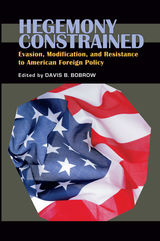
An international group of contributors considers how and why a variety of foreigners act strategically to avoid, delay, or change American policy with respect to a broad range of issues in world affairs. Individual chapters analyze the Kurds and Shia in Iraq; the governments of China, Japan, Turkey, and Germany; the G-7; liberalizing the international economy; coping with global warming; regulating harmful tax competition; controlling missile proliferation; limiting public health damage from tobacco; and international public opinion bearing on the politics of responding to a hegemonic America.
By recognizing and illustrating moves that challenge American unilateralism, Hegemony Constrained provides a framework for understanding and anticipating the goals, motives, and means others in the world bring to their dealings with American hegemony in specific situations. Thus, it offers a corrective to naively optimistic unilateralism and naively optimistic multilateralism.
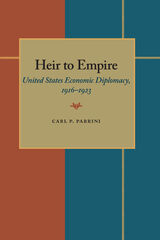
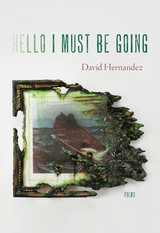
Hello I Must Be Going, David Hernandez’s fifth collection of poems, offers a unique take on poetry informed by works of art, in particular the work of artist Ed Ruscha. With narrative and lyrical brushstrokes, Hernandez crafts vibrant landscapes that depict the chaos of the modern world and the beauty entwined within it. Hello I Must Be Going pulses with originality. This is a book of our time, and of time itself—of unrest, loss, grief, and “this endless parade / shimmering toward silence.”
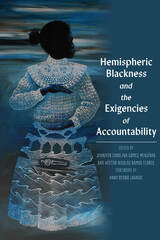
Hemispheric Blackness and the Exigencies of Accountability examines the way Afrodescendant and Black communities use the land on which they live, the rule of law, and their bodies to assert their historical, ontological, and physical presence across South, Central, and North America. Their demand for the recognition of ancestral lands, responsive policies, and human rights sheds new light on their permanent yet tenuous presence throughout the region. The authors argue that by deploying a discourse of transcontinental historical continuity, Black communities assert their presence in local, national, and international political spheres. This conceptualization of hemispheric Blackness is the driving force confronting the historical loss, dismissal, and disparagement of Black lives across the Américas. Through twelve case studies that cover a wide range of locations, their work examines contemporary manifestations of sovereignty of Black body and mind, Black-Indigenous nexuses, and national revisions that challenge more than a quincentennial of denial and state unaccountability in the hemisphere.

“In 1934 the city of Paris saw the birth of a book, published in English, which achieved instantaneous notoriety. Henry Miller’s Tropic of Cancer unfolded the adventures of a loquacious, free-wheeling, appallingly uninhibited American expatriate. But the rollicking eloquence, determined gusto, and explosive imagery of this modern Rabelais barely concealed the figure of a lonely American writer, thoroughly immersed in a legendary American situation.”—from the Introduction
Baxter examines Miller’s relationship with his native land and with Europe through his writings and in the comments of his critics and friends, navigating through the inconsistencies and the evolution of his opinions as his experiences changed. Her insights offer a complex, nuanced evaluation of Miller as writer and as expatriate.
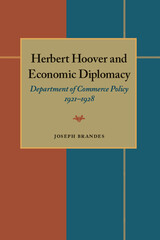
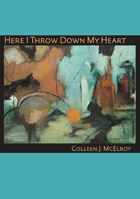
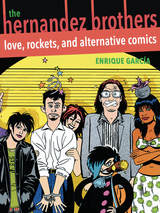

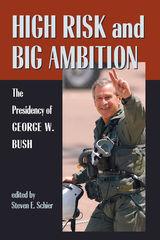
High Risk and Big Ambition brings together leading presidency scholars and journalists to assess the trajectory and character of Bush’s time in office. The common theme running through their contributions is that this presidency is best characterized by a series of bold political and policy risks in the service of two primary goals: the transformation of American foreign policy and the creation of a lasting Republican dominance of domestic politics.
Included are discussions of foreign policy, national security, the war in Iraq, Bush’s leadership style, religious politics, and economic policy. George W. Bush emerges as an "orthodox innovator" who skillfully deploys both personal politics and the power of his office in an effort to complete the conservative governmental agenda initiated by Ronald Reagan. Yet because of the size of his ambitions, each success sets up a greater risk of failure. That alone makes his presidency one of the most interesting and consequential in decades.

Hitler's barber imagines what might have been if only he'd leaned his weight into the razor. An oblivious Coronado narrowly avoids an ambush on the American plains. Freud lecherously lifts the skirt of a Mexican housekeeper who has far too much work to be bothered by “a pillar of modern thought. Or just some dirty old man.”
In lesser hands such disparate elements might fly wildly out of control. But in David Shumate's understated, brilliant prose poems, they come together in miraculously vivid riffs.
The narrator of the title poem rhapsodizes, “I wouldn't mind seeing another good flood before I die. It's been dry for decades. Next time I think I'll just let go and drift downstream and see where I end up.” Shumate's deft and refreshing collection takes us to amazing places with its plainspoken meditations.

Every time control of the U.S. presidency is passed from one party to another, the entire top layer of the executive branch changes. Thousands of men and women take down their pictures, pack up their desks, and move back into private life, just as others dust off their pictures and move in. The U.S. stands alone in this respect. Nearly every other advanced democracy is managed-save for elected officials and a few top aides-by an elite cadre of top civil servants selected by highly competitive examinations.
Hudleston and Boyer tell the story of U.S. efforts to develop higher civil service, beginning with the Eisenhower administration and culminating in the passage of the Civil Service Reform Act of 1978. Arguing that the highly-politicized U.S. system simply hasn't worked, they examine why and how reform efforts have failed and offer a series of recommendations for the future.
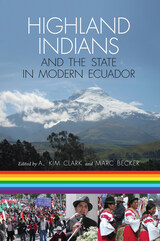
Highland Indians and the State in Modern Ecuador chronicles the changing forms of indigenous engagement with the Ecuadorian state since the early nineteenth century that, by the beginning of the twenty-first century, had facilitated the growth of the strongest unified indigenous movement in Latin America.
Built around nine case studies from nineteenth- and twentieth-century Ecuador, Highland Indians and the State in Modern Ecuador presents state formation as an uneven process, characterized by tensions and contradictions, in which Indians and other subalterns actively participated. It examines how indigenous peoples have attempted, sometimes successfully, to claim control over state formation in order to improve their relative position in society. The book concludes with four comparative essays that place indigenous organizational strategies in highland Ecuador within a larger Latin American historical context.
Highland Indians and the State in Modern Ecuador offers an interdisciplinary approach to the study of state formation that will be of interest to a broad range of scholars who study how subordinate groups participate in and contest state formation.
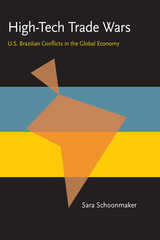
Sara Schoonmaker uses the technology industry to delve into one of the key political conflicts of our time: the construction of a free trade regime determined to open markets around the world to global capital, and attempts by Latin American, African, and other governments to resist this process. The Brazilian computer case is a prime example of a nationalist effort to promote local growth of a key high-technology industry—an effort that was eventually dismantled under the pressures of what Schoonmaker views as part of a broader process of neoliberal globalization.
High-Tech Trade Wars presents a multidimensional view of the globalization process, where economic changes are shaped by political struggle and cultural discourse. It includes interviews with Brazilian industrialists and state officials involved with implementing and, eventually, dismantling Brazil’s informatics policy, and discussions of grassroots-level protests organized against neoliberal globalization during the recent WTO meetings in Seattle and Davos, Switzerland.

Musically complex and intellectually sophisticated, Louise McNeill’s imagery and rhythms have their deepest sources in the West Virginia mountains where she was born in 1911 on a farm that has been in her family for nine generations. These are rooted poems, passionately concerned with stewardship of the land and with the various destructions of land and people that often come masked as “progress.”
In colloquial, rural, and sometimes macabre imagery, Louise McNeill documents the effects of the change from a farm to an industrial economy on the West Virginia mountain people. She writes of the earliest white settlements on the western side of the Alleghenies and of the people who remained there through the coming of the roads, the timber and coal industries, and the several wars of this century.
The reappearance of Louise McNeill’s long out-of-print poems will be cause for celebration for readers familiar with her work. Those reading it for the first time will discover musical, serious, idiosyncratic, and startling poems that define the Appalachian experience.
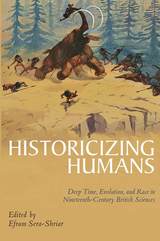
A number of important developments and discoveries across the British Empire's imperial landscape during the nineteenth century invited new questions about human ancestry. The rise of secularism and scientific naturalism; new evidence, such as skeletal and archaeological remains; and European encounters with different people all over the world challenged the existing harmony between science and religion and threatened traditional biblical ideas about special creation and the timeline of human history. Advances in print culture and voyages of exploration also provided researchers with a wealth of material that contributed to their investigations into humanity’s past.
Historicizing Humans takes a critical approach to nineteenth-century human history, as the contributors consider how these histories were shaped by the colonial world, and for various scientific, religious, and sociopolitical purposes. This volume highlights the underlying questions and shared assumptions that emerged as various human developmental theories competed for dominance throughout the British Empire.
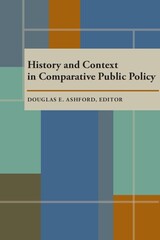
Douglas E. Ashford joins a growing number of scholars who have questioned the behavioralist assumptions of much policy science. The essays in this volume show why policy analysis cannot be confined to prevailing methods of social science. Policy-making behavior involves historical, contextual, and philosophical factors that also raise critical questions about the concepts and theory of the discipline. Ashford asks difficult questions about the contextual, conjunctural, and unintentional circumstances that affect actual decision-making. His bridging essays summarize opposing viewpoints and conflicting interpretations to help form a new agenda for comparative policy analysis.

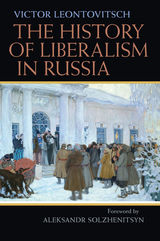
Foreword by Aleksandr Solzhenitsyn
The influence of liberalism in tsarist Russia is deeply problematic to most historians. In this highly original study, Victor Leontovitsch offers a reinterpretation of liberalism in a uniquely Russian form. He documents the struggles to develop civil society and individual liberties in imperial Russia up until their ultimate demise in the face of war, revolution, and the collapse of the old regime.
From Catherine the Great’s proposal of freedom for serfs born after a predetermined year, through the creation of zemstvos by Alexander II, and the emergence of the State Duma and a quasi-constitutional monarchy under Nicholas II, Leontovitsch chronicles the ebb and flow of liberal thought and action in the difficult circumstances of tsarist Russia. He cites numerous examples of debates over civil rights, property laws, emancipation, local jurisdiction, political rights, and constitutional proposals. Focusing on liberal reforms and reformers within the governing elite, Leontovitsch draws important distinctions between factions of radical (but fundamentally illiberal) progressives and true (but often concealed) liberalism.
This is the first English-language translation of Leontovitsch’s monumental work, which was originally published to critical acclaim in German in 1957. Aleksandr Solzhenitsyn sponsored a Russian edition in 1980, and his introduction is translated for the foreword of this edition. With a wide readership in today’s Russia, The History of Liberalism in Russia continues to resonate as a penetrating analysis of the historical precedents of liberal thought and its potential as a counterweight to current autocratic tendencies and the uncertainties of Russia’s political future.

Foreword by Clyde Barker and Thomas E. Starzl
A History of Organ Transplantation is a comprehensive and ambitious exploration of transplant surgery—which, surprisingly, is one of the longest continuous medical endeavors in history. Moreover, no other medical enterprise has had so many multiple interactions with other fields, including biology, ethics, law, government, and technology. Exploring the medical, scientific, and surgical events that led to modern transplant techniques, Hamilton argues that progress in successful transplantation required a unique combination of multiple methods, bold surgical empiricism, and major immunological insights in order for surgeons to develop an understanding of the body’s most complex and mysterious mechanisms. Surgical progress was nonlinear, sometimes reverting and sometimes significantly advancing through luck, serendipity, or helpful accidents of nature.
The first book of its kind, A History of Organ Transplantation examines the evolution of surgical tissue replacement from classical times to the medieval period to the present day. This well-executed volume will be useful to undergraduates, graduate students, scholars, surgeons, and the general public. Both Western and non-Western experiences as well as folk practices are included.
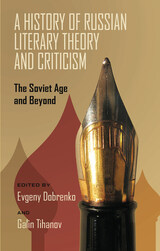
This volume assembles the work of leading international scholars in a comprehensive history of Russian literary theory and criticism from 1917 to the post-Soviet age. By examining the dynamics of literary criticism and theory in three arenas—political, intellectual, and institutional—the authors capture the progression and structure of Russian literary criticism and its changing function and discourse.
The chapters follow early movements such as formalism, the Bakhtin Circle, Proletklut, futurism, the fellow-travelers, and the Russian Association of Proletarian Writers. By the cultural revolution of 1928, literary criticism became a mechanism of Soviet policies, synchronous with official ideology. The chapters follow theory and criticism into the 1930s with examinations of the Union of Soviet Writers, semantic paleontology, and socialist realism under Stalin. A more “humanized” literary criticism appeared during the ravaging years of World War II, only to be supplanted by a return to the party line, Soviet heroism, and anti-Semitism in the late Stalinist period. During Khrushchev’s Thaw, there was a remarkable rise in liberal literature and criticism, that was later refuted in the nationalist movement of the “long” 1970s. The same decade saw, on the other hand, the rise to prominence of semiotics and structuralism. Postmodernism and a strong revival of academic literary studies have shared the stage since the start of the post-Soviet era.
For the first time anywhere, this collection analyzes all of the important theorists and major critical movements during a tumultuous ideological period in Russian history, including developments in émigré literary theory and criticism.

The U.S. war in Iraq was not only an intelligence failure—it was a failure in democratic discourse. Hitting First offers a critical analysis of the political dialogue leading up to the American embrace of preventive war as national policy and as the rationale for the invasion and occupation of Iraq. Taking as its point of departure the important distinction between preemptive and preventive war, the contributors examine how the rhetoric of policy makers conflated these two very different concepts until the public could no longer effectively distinguish between a war of necessity and a war of choice.
Although the book focuses on recent events, Hitting First takes into consideration the broader historical, ethical, and legal context of current American policies. Precedents are examined for preventive military action based on conventional as well as nuclear, biological, and chemical weapons threats. The authors also consider recent examples of the rhetoric of “humanitarian intervention,” which have tended to undermine traditional notions of national sovereignty, making purportedly “morally justifiable” actions easier to entertain. Intelligence gathering and its use, manipulation, and distortion to suit policy agendas are also analyzed, as are the realities of the application of military force, military requirements to sustain a policy of preventive war, and post-conflict reconstruction.
Hitting First presents a timely and essential view of the lessons learned from the failures of the Iraqi conflict, and offers a framework for avoiding future policy breakdowns through a process of deliberative public and governmental debate within a free market of ideas. The critiques and prescriptions offered here provide a unique and valuable perspective on the challenges of formulating and conduct of national security policy while sustaining the principles and institutions of American democracy. This collection will appeal to students and scholars of American foreign policy, international relations, political communication, and ethics.
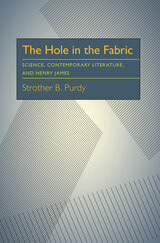
In this imaginative and provocative book, Purdy draws upon the work of a such writers as Kurt Vonnegut, Vladimir Nabokov, Alain Robbe-Grillet, Günter Grass, Samuel Becket, and Eugene Ionesco to suggest ways in which novelists explore the unknown. His ingenious consideration of Henry James in conjunction with these novelists, as well as with science fiction and detective fiction writers and with mid-century scientific discoveries and advances—black holes, hydrogen bombs, space travel—offers rich, new insights into James’s work and into the twentieth-century view of humanity’s place in the world.
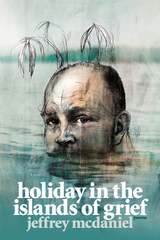
Jonathan
We are underwater off the coast of Belize.
The water is lit up even though its dark
as if there are illuminated seashells
scattered on the ocean floor.
We’re not wearing oxygen tanks,
yet staying underwater for long stretches.
We are looking for the body of the boy
we lost. Each year he grows a little older.
Last December I opened his knapsack
and stuck in a plastic box of carrots.
Even though we’re underwater, we hear
a song playing over a policeman’s radio.
He comes to the shoreline to park
and eat midnight sandwiches, his headlights
fanning out across the harbor.
And I hold you close, apple of my closed eye,
red dance of my opened fist.
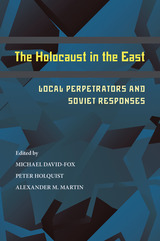
Since its founding, the journal Kritika: Explorations in Russian and Eurasian History has led the way in exploring the East European and Soviet experience of the Holocaust. This volume combines revised articles from the journal and previously unpublished pieces to highlight the complex interactions of prejudice, power, and publicity. It offers a probing examination of the complicity of local populations in the mass murder of Jews perpetrated in areas such as Poland, Ukraine, Bessarabia, and northern Bukovina and analyzes Soviet responses to the Holocaust.
Based on Soviet commission reports, news media, and other archives, the contributors examine the factors that led certain local residents to participate in the extermination of their Jewish neighbors; the interaction of Nazi occupation regimes with various sectors of the local population; the ambiguities of Soviet press coverage, which at times reported and at times suppressed information about persecution specifically directed at the Jews; the extraordinary Soviet efforts to document and prosecute Nazi crimes and the way in which the Soviet state’s agenda informed that effort; and the lingering effects of silence about the true impact of the Holocaust on public memory and state responses.
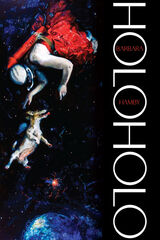
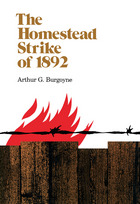
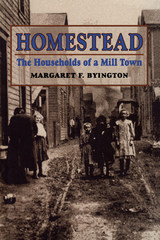

First published in 1910 in the classic Pittsburgh Survey, this pioneering work of American social history, reproduced in its entirety, describes daily life in a community that was dominated economically and physically by the giant Homestead Works of the United States Steel Corporation. The town of Homestead, just across the Monongahela River from Pittsburgh, developed as a completely separate city—a true mill town settled by newer immigrants and shaped in its attitudes by the infamous Homestead Strike of 1892, which significantly set back unionization efforts in the steel industry. Homestead:The Households of a Mill Town not only focuses on the plight of the American steel worker in the late nineteenth and early twentieth century, it also explores the domestic and community aspects of life in that time period.
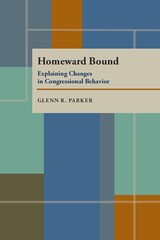
Richard Fenno first coined the term home style to describe the ways in which members of Congress cultivate the voters of their home constituencies. He suggested that incumbents were paying more attention to their constituents than they had in the past. In this book, Glenn Parker examines the relationship between activities at home and in Washington, asking specifically: Why and when did congressmen and senators begin to pay more attention to their constituents? And what are the institutional consequences of this change?
Using data drawn from the travel vouchers filed by incumbent senators and congressmen between 1959 and 1980, Parker shows that since the mid-1960s incumbents have been placing greater emphasis on service to their state or district. Congress has facilitated this change in various ways, such as by increasing travel allowances and by scheduling that minimizes the conflict between legislative business in Washington and time spent with constituents.
Parker's study includes both the Senate and House, and he draws distinctions between the home-style behaviors of senators and representatives. He also provides a historical context for understanding the dynamics of changes in home style. The time-series data generate explanations that specify relationships among historical conditions, individual behavior, and institutional structures.
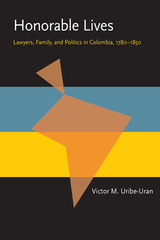
Honorable Lives features three genealogical charts detailing bureaucratic networks established by families of lawyers in different historical periods. The text also contains an abundant series of statistical tables and charts, and concise biographical information on approximately 150 Latin American lawyers. This book will appeal to Latin Americanists, students of law, and anyone interested in the lives and histories of lawyers.

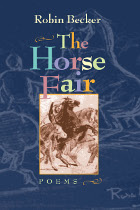
The Horse Fair takes its name from Bonheur's monumental painting and serves as the vehicle through which Becker explores anti-Semitism, cross-dressing, and Bonheur's lifelong relationships with women. In Becker's hands, The Horse Fair transports us to the communal plaza where we come to barter and to buy, to study one another, to touch the foundation upon which we build our temporary habitations.
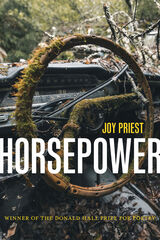
FROM "RODEO"
The four-wheeler is a chariot. Horse-wraiths
Kicking up a plume of spirits in the dirt behind us.
Her arms kudzu around my middle. Out here,
In the desert, everything is invisible.
Only the locusts’ flat buzz gives
Them away. Everything native & quieting
Perennial & nighthawk black
As we ride through: the cowgirls,
The witch & the water sky-mirror-split,
The severity of squall lines. Also, the lips
Parting air like lightning & the girl
Blowing bubbles—in each one
a rainbow.
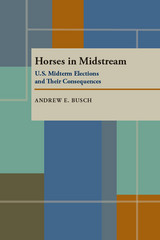
Horses in Midstream breaks the mold of midterm election literature by focusing on the consequences of midterm elections rather than on the causes of the anti-administration pattern of those elections. The book concludes that the midterm pattern has two primary consequences: it stymies the President and provides an opportunity for the revitalization of the opposition party—and that numerical losses by the President's party is really only a small part of the equation. Consequently, midterm elections can be considered an additional check in the U.S. political system, acting as a mechanism that helps to assure rough two party balance.
In examining the historical results from midterm elections dating back to 1894 and extending to the surprising result of 1994 and 1998, Busch has uncovered seven consistent ways in which the president and his party are harmed by midterm elections. These elections unfavorably alter the composition of congress, both between the parties and within the President's own party; they deprive the President of the plebiscitary power derived from his original electoral mandate; they give an intangible sense of momentum to the opposition party, leading to renewed opportunities for the opposition to put forward new leaders and to develop winning issues; they exacerbate splits within the President's own party; and they provide the opposition party with expanded party-building opportunities at the state level. Busch also places the midterm elections into four categories: "preparatory" midterms, which contribute to a subsequent change in party control of the Presidency; "calibrating" midterms in which voters slow but do not reverse extraordinary periods of Presidentially-driven change; "normal" midterms when midterm elections stymie the President without contributing to a White House takeover; and the rare "creative exceptions" when an administration escapes the midterm curse at the polls and find themselves invigorated rather than weakened. Busch's new approach to midterm elections, his well supported conclusions, and his clear, consistent style will certainly be of interest to political scientists and will translate well to the classroom.
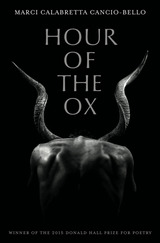
Hour of the Ox received the 2015 AWP Donald Hall Prize for Poetry, selected by Crystal Ann Williams, who called it “a timeless collection written by a poet of exceptional talent and grace, a voice as tough as it is tender.” Cancio-Bello examines the multiplicity of distance, wanderlust, and grief at the intersection between filial and cultural responsibility. Desires are sloughed off, replaced by new ones, re-cultivated as mythos. These poems offer a complex and necessary new perspective on the elegiac immigrant song.

In A House Divided, Richard Orr Curry investigates the political realities that led to the breakup of the Old Dominion and the emergence of a new state during the Civil War. Orr's analysis of the intra-state conflicts over political, economic, and social issues, party factions of Unionism and Secessionism and multiple layers of division within those factions, offer fascinating and original insights into the long debate that would lead to the ratification of the West Virginia state constitution in 1863.
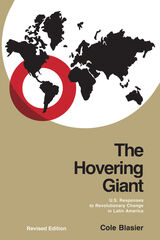
In the first edition of The Hovering Giant, Cole Blasier analyzed U.S. response to revolutions in Latin America from Madero in Mexico to Allende in Chile. He explained why U.S. leaders sponsored paramilitary units to overthrow revolutionary governments in Guatemala and Cuba and compromised their own differences with revolutionary governments in Mexico and Bolivia. The protection of private U.S. interests was part of the explanation, but Blasier gave greater emphasis to rivalry with Germany or the Soviet Union.
Now in this revised edition, Blasier also examines the responses of the Carter and Reagan administrations to the Grenadian and Nicaraguan revolutions and the revolt in El Salvador. He also brings up to date the interpretation of U.S.-Cuban relations.
Blasier stresses U.S. defense of its preeminent position in the Caribean Basin, as well as rivalry with the Soviet Union, to explain these later U.S. responses. Seemingly unaware of historical experience, Washington followed patterns in Central America and Grenada similar to earlier patterns in Guatemala, Cuba, and Chile even though the latter had adverse effects on U.S. security and economic interests.
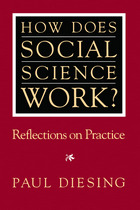
The culmination of a lifetime spent in a variety of fields - sociology, anthropology, economics, psychology, and philosophy of science - -How Does Social Science Work? takes an innovative, sometimes iconoclastic look at social scientists at work in many disciplines. It describes how they investigate and the kinds of truth they produce, illuminating the weaknesses and dangers inherent in their research.
At once an analysis, a critique, and a synthesis, this major study begins by surveying philosophical approaches to hermeneutics, to examine the question of how social science ought to work. It illustrates many of its arguments with untraditional examples, such as the reception of the work of the political biographer Robert Caro to show the hermeneutical problems of ethnographers. The major part of the book surveys sociological, political, and psychological studies of social science to get a rounded picture of how social science works,
Paul Diesling warns that “social science exists between two opposite kinds of degeneration, a value-free professionalism that lives only for publications that show off the latest techniques, and a deep social concern that uses science for propaganda.” He argues for greater self-awareness and humility among social scientists, although he notes that “some social scientists . . . will angrily reject the thought that their personality affects their research in any way.”
This profound and sometimes witty book will appeal to students and practitioners in the social sciences who are ready to take a fresh look at their field. An extensive bibliography provides a wealth of references across an array of social science disciplines.

Nations use product standards, and manipulate them, for reasons othen than practical use or safety. The Soviets once cultivated standards to isolate themselves. In the United States, codes and standards are often used to favor home industries over external competition, and to favor some producers over others. Krislov compares and contrasts the United States, the EC, the forner Eastern bloc, and Japan, to link standard choice with political styles and to trace growing internationalization based on product efficiency criteria.
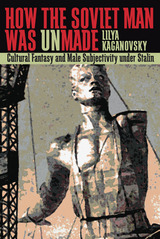
In How the Soviet Man Was Unmade, Lilya Kaganovsky exposes the paradox behind the myth of the indestructible Stalinist-era male. In her analysis of social-realist literature and cinema, she examines the recurring theme of the mutilated male body, which appears with startling frequency. Kaganovsky views this representation as a thinly veiled statement about the emasculated male condition during the Stalinist era. Because the communist state was “full of heroes,” a man could only truly distinguish himself and attain hero status through bodily sacrifice-yet in his wounding, he was forever reminded that he would be limited in what he could achieve, and was expected to remain in a state of continued subservience to Stalin and the party.
Kaganovsky provides an insightful reevaluation of classic works of the period, including the novels of Nikolai Ostrovskii (How Steel Was Tempered) and Boris Polevoi (A Story About a Real Man), and films such as Ivan Pyr'ev's The Party Card, Eduard Pentslin's The Fighter Pilots, and Mikhail Chiaureli's The Fall of Berlin, among others. The symbolism of wounding and dismemberment in these works acts as a fissure in the facade of Stalinist cultural production through which we can view the consequences of historic and political trauma.
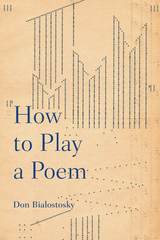

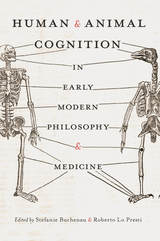
This edited volume focuses on medical and philosophical debates on human intelligence and animal perception in the early modern age, providing fresh insights into the influence of medical discourse on the rise of modern philosophical anthropology. Contributions from distinguished historians of philosophy and medicine focus on sixteenth-century zoological, psychological, and embryological discourses on man; the impact of mechanism and comparative anatomy on philosophical conceptions of body and soul; and the key status of sensibility in the medical and philosophical enlightenment.
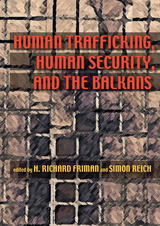
Human Trafficking, Human Security, and the Balkans brings together leading scholars, NGO representatives, and government officials to analyze and offer solutions to this challenge. The contributors explore the economic dynamics of human trafficking in an era of globalization, which has greatly facilitated not only the flow of goods and services but also the trade in human beings. They also examine the effectiveness of international and transnational policies and practice, the impact of peacekeeping forces, and the emergence of national and regional action plans in the Western Balkans and, more broadly, in South Eastern Europe. Finally, they consider the nature and ramifications of the gap between human security rhetoric and institutional policy steps against human trafficking.

Selected by Arthur Sze
Hyperboreal originates from diasporas. It attempts to make sense of change and to prepare for cultural, climate, and political turns that are sure to continue. The poems originate from the hope that our lives may be enriched by the expression of and reflection on the cultural strengths inherent to indigenous culture. It concerns King Island, the ancestral home of the author's family until the federal government's Bureau of Indian Affairs forcibly and permanently relocated its residents. The poems work towards the assembly of an identity, both collective and singular, that is capable of looking forward from the recollection and impact of an entire community's relocation to distant and arbitrary urban centers. Through language, Hyperboreal grants forum to issues of displacement, lack of access to traditional lands and resources and loss of family that King Island people—and all Inuit—are contending with.
READERS
Browse our collection.
PUBLISHERS
See BiblioVault's publisher services.
STUDENT SERVICES
Files for college accessibility offices.
UChicago Accessibility Resources
home | accessibility | search | about | contact us
BiblioVault ® 2001 - 2024
The University of Chicago Press









